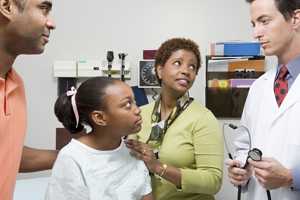HPV Vaccine
The Advisory Committee on Immunization Practices (ACIP) recommends—
- Routine HPV vaccination be initiated at age 11 or 12 years for both boys and girls. The vaccination series of three shots can be started at age 9 years.
- Vaccination is also recommended for females aged 13 through 26 years and for males aged 13 through 21 years who have not been vaccinated previously or who have not completed the three-dose series.
- Males aged 22 through 26 years may be vaccinated.
- Vaccination of females is recommended with the bivalent (2vHPV), quadrivalent (4vHPV) (as long as this formulation is available), or 9-valent (9vHPV) versions.
- Vaccination of males is recommended with 4vHPV (as long as this formulation is available) or 9vHPV.
- Either 9vHPV or 4vHPV vaccination is recommended for men who have sex with men and immunocompromised persons (including those with HIV infection) through age 26 years if not vaccinated previously.

For the HPV vaccine to be most effective, it should be given prior to exposure to HPV. Therefore, all three doses of the vaccine are recommended long before any type of sexual activity and potential exposure to HPV. However, even if sexually active, it is unlikely that the person would be exposed to all of the HPV types the vaccine covers; therefore, the person would derive some benefit from vaccination.
HPV vaccination is recommended if a patient is sexually active, has a history of abnormal cytology, genital warts, other sexually transmitted infections, or pregnancy. The vaccine may be less effective in some populations, particularly women with a history of LSIL or HSIL, abnormal cervical cytology, or genital warts, and immunocompromised men and women, but these individuals should still be vaccinated.
Keep in mind, the HPV vaccine is not a treatment for HPV infection, genital warts, LSIL, or HSIL.
Continued cervical cancer screening of vaccinated patients is needed. While HPV infection rates are going down due to vaccination, it is too soon to see evidence that the vaccine has resulted in a notable decrease in cervical cancer as an endpoint because of the lag time between HPV exposure and cervical cancer development. Continued screening of patients is recommended, as the vaccine does not cover all cancer-causing HPV types, and sexually active women could have been infected prior to vaccination. Finally, it is important to note that studies (with up to about 8 to 10 years of follow-up data) indicate no evidence of waning protection after vaccination.
Knowledge Check
Answer the question on your own and check your answer.
Is it appropriate to recommend the HPV vaccine for a 16-year-old sexually active patient? 
Answer: Yes.
- Page last reviewed: September 14, 2015
- Page last updated: September 14, 2015
- Content source:


 ShareCompartir
ShareCompartir